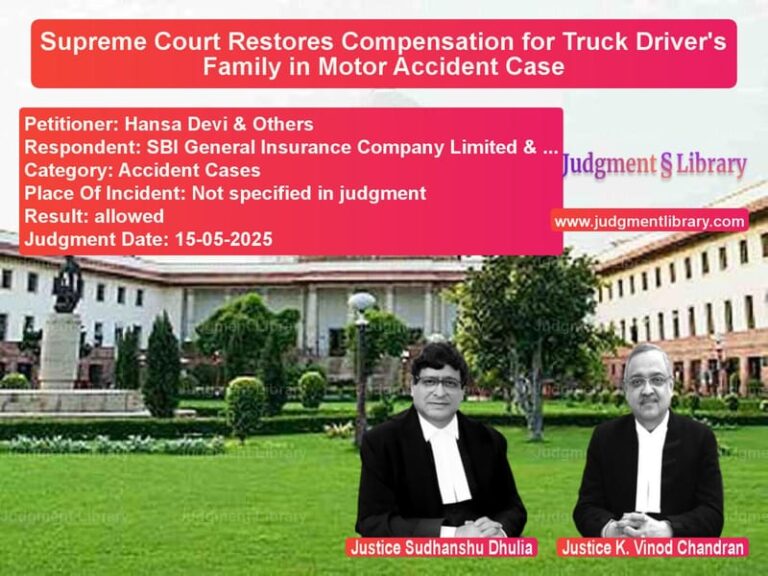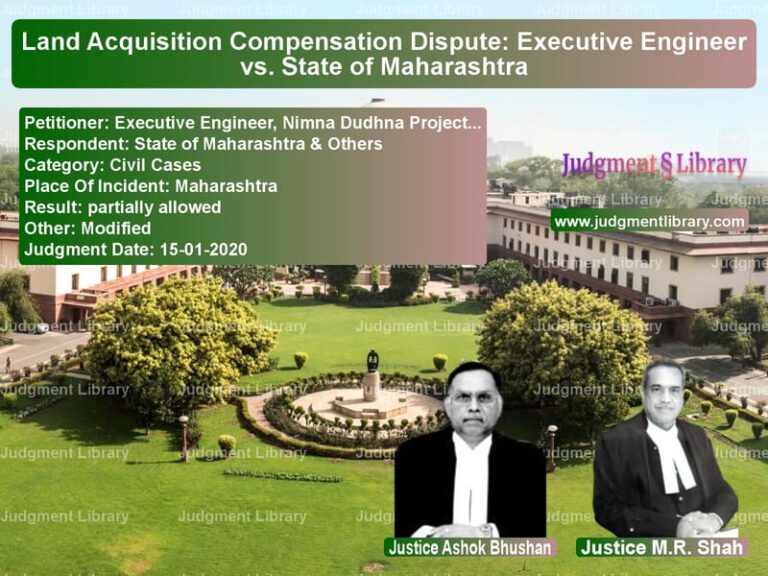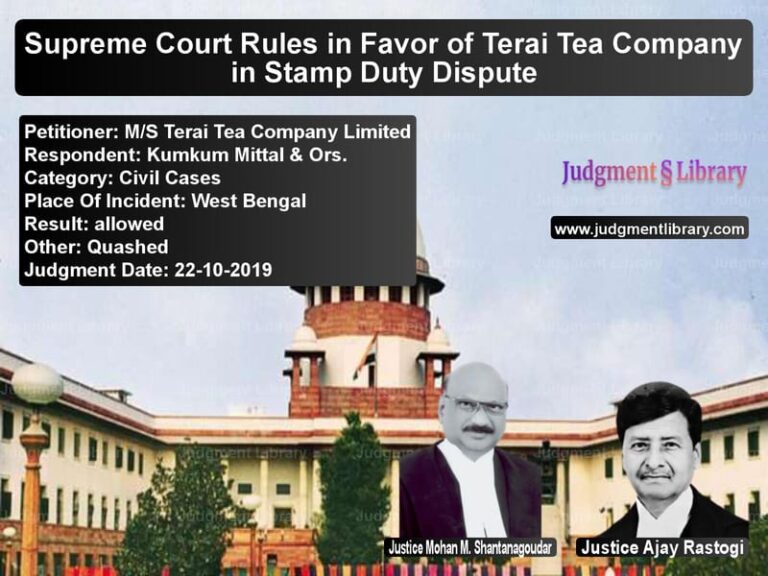Court’s Ruling on Suicide and Criminal Liability: A Deep Dive into the Case of Vaijnath Kondiba Khandke
The case of Vaijnath Kondiba Khandke v. State of Maharashtra involves crucial questions surrounding criminal liability, specifically Section 306 of the Indian Penal Code (IPC) concerning abetment of suicide. The Supreme Court had to determine whether a senior officer’s actions, allegedly contributing to the suicide of a junior officer, were sufficient grounds for invoking Section 306 IPC. The Court’s ruling in this case delves into the boundaries of criminal responsibility, offering important clarifications on the matter of ‘instigation’ and ‘abetment’ of suicide in workplace harassment cases.
Background of the Case
The appellant, Vaijnath Kondiba Khandke, was a superior officer at the office of the Deputy Director of Education, Aurangabad, Maharashtra. The case arose from the tragic suicide of Kishor Parashar, an employee at the same office, on 8th August 2017. According to Kishor’s wife, the deceased had been subjected to severe mental harassment and work pressure, leading to his eventual suicide. Specifically, the appellant, along with another coworker, was accused of causing mental torture by imposing excessive work hours and threats of withholding salary and promotion.
FIR No.268 of 2017 was filed on 9th August 2017, accusing Vaijnath Kondiba Khandke and Vidya Ghorpade of abetting the suicide under Sections 306, 506, and 34 of the IPC. Both accused filed applications under Section 482 of the Criminal Procedure Code (CrPC) to quash the FIR. The High Court quashed the proceedings against Vidya Ghorpade, but the appellant’s plea was dismissed, leading to the appeal before the Supreme Court.
Key Legal Issues
- Whether the actions of the appellant, a senior officer, could be construed as instigation or abetment under Section 306 IPC.
- Whether workplace pressure and the cessation of salary could be seen as acts leading to the suicide of an employee.
- Whether the absence of a suicide note and the reliance on a widow’s statements were enough to establish the abetment of suicide.
Arguments by the Petitioner (Vaijnath Kondiba Khandke)
The petitioner argued that:
- The allegations made by the deceased’s wife were vague and unsupported by concrete evidence.
- There was no direct evidence of ‘instigation’ or any criminal intent that led to the deceased’s suicide.
- Merely assigning work to an employee or withholding salary does not amount to instigation for suicide.
- The actions taken by him were in line with his duties and did not have a malicious or unlawful intent.
Arguments by the Respondent (State of Maharashtra)
The respondent, State of Maharashtra, represented by Ms. Deepa M. Kulkarni, argued that:
- The deceased’s wife had given detailed accounts of how her husband was subjected to unbearable mental stress and harassment by the appellant and his co-worker.
- The appellant’s actions, such as the threat to stop the salary and the undue work pressure, created a situation of mental anguish that contributed to the suicide.
- Workplace harassment can lead to extreme emotional distress and could be considered a form of abetment of suicide if it drives an individual to take their life.
Supreme Court’s Observations
The Supreme Court examined the case in light of precedents, including Madan Mohan Singh v. State of Gujarat and Praveen Pradhan v. State of Uttaranchal. The Court made the following key observations:
“For the invocation of Section 306 IPC, there must be clear evidence of instigation or aiding the suicide, either directly or indirectly. In the absence of a suicide note, the onus of establishing that the accused’s conduct led to the suicide lies on the prosecution.”
The Court also discussed previous rulings where the relationship between work-related stress and suicide had been considered. In Praveen Pradhan v. State of Uttaranchal, the Court had found that workplace harassment causing humiliation and disgrace could be grounds for abetment, but that case also involved direct statements from the deceased.
“While workplace harassment may lead to emotional distress, the mere assignment of work or withholding of salary does not in itself amount to criminal liability under Section 306 IPC unless it can be shown that the accused’s actions were designed to drive the victim to suicide.”
The Court noted that in the present case, there was no suicide note, and the only evidence was the widow’s statement. The Court stated:
“The allegations against the appellant are largely based on the deceased’s wife’s statements, which alone are insufficient to establish a case under Section 306 IPC.”
Final Judgment
The Supreme Court quashed the criminal proceedings against the appellant, stating that the allegations in the FIR did not make out a case for abetment of suicide. The Court observed:
“In the absence of concrete evidence, particularly a suicide note, and in light of the vague allegations made by the deceased’s wife, there is no sufficient ground to proceed with the charges under Section 306 IPC. The facts do not establish the necessary legal foundation for the offence.”
Thus, the appeal was allowed, and the criminal case against Vaijnath Kondiba Khandke was quashed.
Implications of the Judgment
This judgment has far-reaching implications for cases involving workplace harassment and the abetment of suicide. The key takeaways from this case include:
- It reiterates that mere allegations of work pressure or financial distress are insufficient to invoke Section 306 IPC without clear evidence of instigation or direct involvement in the victim’s decision to commit suicide.
- It clarifies the legal thresholds required to prove the criminal liability of an accused in abetment of suicide cases, particularly in the absence of a suicide note or direct evidence.
- It sets an important precedent for future cases involving work-related stress and its legal implications under criminal law.
Conclusion
The Supreme Court’s decision in Vaijnath Kondiba Khandke v. State of Maharashtra marks a significant ruling on the interpretation of Section 306 of the IPC in cases of suicide involving workplace harassment. By quashing the proceedings against the appellant, the Court reinforced the need for substantial evidence before criminal liability can be imposed for abetment of suicide. This judgment also underscores the importance of a detailed investigation and concrete evidence in such sensitive and complex cases.
Petitioner Name: Vaijnath Kondiba Khandke.Respondent Name: State of Maharashtra.Judgment By: Justice Uday Umesh Lalit, Justice Arun Mishra.Place Of Incident: Maharashtra.Judgment Date: 17-05-2018.
Don’t miss out on the full details! Download the complete judgment in PDF format below and gain valuable insights instantly!
Download Judgment: Vaijnath Kondiba Kha vs State of Maharashtra Supreme Court of India Judgment Dated 17-05-2018.pdf
Direct Downlaod Judgment: Direct downlaod this Judgment
See all petitions in Murder Cases
See all petitions in SC/ST Act Case
See all petitions in Suicide Cases
See all petitions in Judgment by Uday Umesh Lalit
See all petitions in Judgment by Arun Mishra
See all petitions in allowed
See all petitions in Quashed
See all petitions in supreme court of India judgments May 2018
See all petitions in 2018 judgments
See all posts in Criminal Cases Category
See all allowed petitions in Criminal Cases Category
See all Dismissed petitions in Criminal Cases Category
See all partially allowed petitions in Criminal Cases Category







